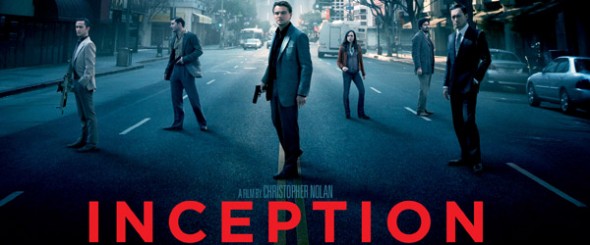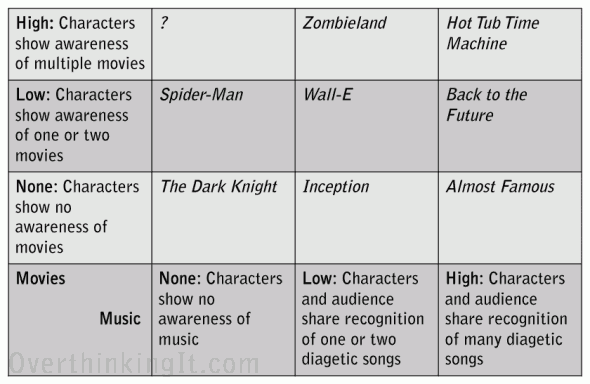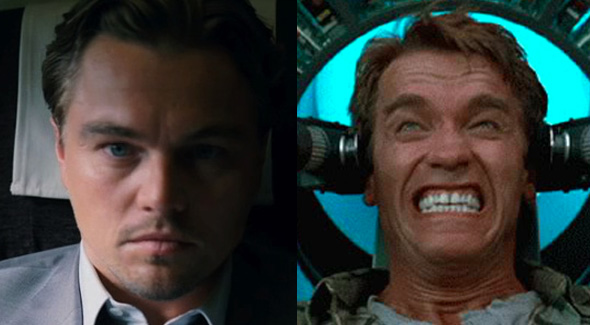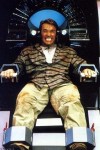
What…the…hell…is…going…on???
While watching Christopher Nolan’s Inception, my mind wast mostly turned to jello from trying to make sense of the movie’s mechanics. Why exactly does the falling van cause weightlessness in the 2nd hotel level, but not the 3rd ice level? Why do they need the fancy dream machines when they’re already inside the dream? What is Christopher Nolan on, and where I can I get myself some of that?
The few solid chunks of brain matter I had remaining, however, asked a far simpler question:
Haven’t any of the characters in this movie seen Total Recall? Or The Matrix?
I don’t know about you, but if I were an elite dream-hacker who dealt constantly with the possibility that my current state of consciousness was a dream and not reality, I’d be constantly making references to these kinds of movies. Well, part of that’s due to the fact that I’m a pop culture reference kind of guy, but it’s also just how most people–not just Overthinkers–go through our lives and interact with friends: we talk about pop culture together, and we connect events in our lives with related works of pop culture.
Inception is devoid of any such references. For all we know, in the universe of Inception, there are no movies whatsoever, or if there are movies, then these characters have either never seen them or have seen them but never talk about them (on screen). What’s going on? Are they living in some sort of, say, dream world that’s divorced from reality? Well, probably (more on that later). But here’s the interesting thing: movies don’t seem to exist in this world, or at least the characters don’t show any awareness of them, but pop music clearly does, and the characters are aware of this. Hence the prominent use of the Edith Piaf song “Je ne regrette rien.”
So the characters in Inception exhibit zero knowledge of any movies, but they do know at least one pop song that the audience also knows. This got me thinking about how this works in other movies: sometimes, characters make reference to one or two movies; occasionally, they’ll make lots of references, and their actions will be highly influenced by movies they’ve seen.
Likewise, with music, a movie can have zero instances of pop music playing that the characters recognize, a few scattered instances, or multiple instances of characters jamming along to our pop music and being highly influenced by it.
Strangely, though, characters’ knowledge of movies and music function independently in movies. In some movies like Inception, characters can be aware of pop music, but not movies. In highly self-aware movies like Kick-Ass, characters exhibit knowledge of, and are highly influenced by, many movies, while exhibiting no knowledge of in-universe pop music. (Correction: pop music does exist in Kick-Ass. See comments below.)
Hmm. This calls for a chart. Ladies and gentlemen, meet the Overthinking It Pop Culture Awareness in Movies Matrix, or as I like to say, OTIPCAIMM.

Note: Chart updated Aug 1, 2010
So what does this all mean?
First, it’s eminently clear that having characters show a high level of awareness of both movies and music is by no means indicative of the realism of movies. If that were the case, then Hot Tub Time Machine would be a gripping drama of coming to terms with adulthood and life choices instead of…well, this:
One thing, though, seems to be clear: it’s very difficult to make a serious (i.e., non-comedic) movie in which characters exhibit a high level of awareness of other movies. It calls attention to the audience that they are, in fact, watching a movie, which can help a comedy/action farce get away with a high degree of unrealism, but would obviously hurt a serious sci-fi movie that’s trying to sell you on the idea of, say, “red matter.”
Awareness of music has the opposite effect. A well-placed pop song–“As Time Goes By” in Casablanca, “Tiny Dancer” in Almost Famous–creates a bridge of common understanding between the characters in a movie and the audience without the plot baggage of the common understanding of movies.
http://www.youtube.com/watch?v=7Qn3tel9FWU
Now, let’s come back to Inception. By this logic, the combination of lack of movie references plus one key music reference should be a good combination for selling the realism of the movie to the audience, right? Mostly.
Let’s imagine what Inception would have been like if the characters had shown awareness of movies like Total Recall and The Matrix through their dialogue and actions. Most likely, it would have come in the form of sarcastic remarks from Ellen Page, which would have had brought audiences back to her role in Juno. Chris Nolan, obviously aware of the meta-casting implications of Marion Cotillard (she played Edith Piaf in the biopic La Vie en Rose), clearly would not have wanted to make such a connection with Ellen Page.
Beyond this specific meta-casting issue, there’s the issue of “selling reality” to the audience. After all, Nolan isn’t exactly trying to sell “realism” to the audience in the way that a typical action/drama movie would. He actually wants the audience to question reality, but only on his terms. Making references to Total Recall and The Matrix, even if they were throw-away, would have taken the audience out of Nolan’s carefully constructed universe and its very specific rules. In this universe, there’s no room for Total Recall or Matrix rules to distract the viewer.
Plus, “Get your ass to Mars!” is not the kind of catchy one-liner that Christopher Nolan is apt to allow in his movies.
As for the music, well, it’s a little more complicated. As I mentioned before, the song “Je ne regrette rien” is the only work of pop culture that we’re made aware of in the world of Inception. The song functions as a recognizable pop song in a movie should: it highlights the poignancy of Cobb’s regrets and mental anguish through the poignancy of the song and the irony of the lyrics (“I regret nothing” vs “I regret, well, everything”). But we have this additional layer of reality-questioning that we must reconcile such an association with. If, by the end of the movie, we’re left questioning whether Cobb’s anguish was “real” or not, then we’re also left questioning the “reality” of the poignancy evoked through the song. But that doesn’t mean it was just a throw-away. At the very least, the presence of this song means that somewhere in this movie, there is in fact a grounded reality that at least has common roots with our own reality. Even if everything we saw in the movie was Cobb’s–or someone else’s–dream, we at least know that the dreamer lives in a universe where Edith Piaf and “Je ne regrette rien” also exist.
But all of this only applies to those in the audience who are actually familiar with this song. Although it’s a fairly famous and popular song throughout the world, it’s still a French song. Plenty of people who saw Inception (a major studio tentpole marketed to a broad American audience) probably don’t know the name Edith Piaf, nor are they consciously aware of the song “Je ne regrette rien.” Yet Nolan was probably counting on those people to have a faint outline or little fragments in their mind of Edith Piaf and her voice. They probably heard it in Saving Private Ryan or in a number of other pop culture works that reference France. Her voice is unique among unique voices to the point where anyone who’s heard it at least a few times would get at least a few hints of recognition from “Je ne regrette rien.”
The people in the audience who fall into this category don’t get the full effect of song recognition, but instead, they get little twinges of recall to something they think they might have heard before but aren’t completely sure. You might event say it’s activating a subconscious memory of the song. Or replicating the effect of trying to remember a dream.
How cool is that? Damn. Christopher Nolan is a genius.
Okay, maybe this reading is a bit of a stretch. Even if it is, I still think that Inception provides us with an interesting opportunity to Overthink the way movies choose to depict pop culture awareness in their characters. So many of our movies purport to exist in our “real world” yet have vastly different ways of reflecting the “real world’s” pop culture, if they choose to at all.


How does Nolan’s other films fair with pop culture references? I can’t recall much of his recent work referring to anything. How about his earlier movies?
I read a recent article (was it on this site?) regarding Pixar’s run of hit movies and their relative lack of pop culture references compared to other animated movies which are filled to the brim with them (Shrek being an example). In the animated movies (and comedies such as Scary Movie, Epic Movie etc.) pop culture references can be a cheap, easy laugh and also the reference goes out of fashion so the film dates really quick. Nolan may have used the lack of pop culture to ground his reality (apart from an established classic song that will live on longer than any of us will) but I don’t think he would have littered Inception with references to other reality bending movies anyway. He’s too smart for that.
I think the Edit Piaf song used in the film would have made a great soundtrack to a trailer for Inception.
I read a piece talking about cheap v. well-done references to popular culture, too, and I think it was on Cinematical.com.
What is interesting about Pixar, though, is that it still makes pop culture references all the bloody time, but they are always references alluding to its own previous works. The Linguini in _Ratatouiile_, for example, wears _Incredibles_ undies. Pixar is loaded with Easter eggs like that, which, somehow, actually do make the worlds being created seem a bit more real. In my experience (my own reactions and those of others I know that have noticed the eggs), at least, they’re always greeted with a, “That’s awesome!” opinion.
Robert,
I think you’re conflating two different levels of pop culture references. I can’t think of two terms off the top of my head to describe them, so I’ll go with “stated” vs. “implied.” A stated reference is when a character in a movie references a work of pop culture, either by discussing it with another character or by referencing it in comparison to the situation they are in. Abed on “Community” does this constantly. In a movie set in the present this can be done fairly realistically in a drama or comedy. It can also be done in a movie set in the past, but creates a farcical quality, such as in virtually every Mel Brooks movie.
An implied reference is very different. This is when the movie itself references another movie. Obviously this is what happens in most spoof movies. When Leslie Nielson claims his innocence in “Wrongfully Accused” by claiming “it wasn’t me! It was the one-armed, one-eyed, one-legged man!” Nobody comments on the similarity between this situation and “The Fugitive.” It’s implied, and it is through that implied reference from which the comedy is derived. This doesn’t only happen in comedies. Filmmakers like Scorsese and Tarantino jam their movies with implied references, aka homage, although they are obviously done much more subtly than in a comedy.
I guess the point that I’m trying to make is that this chart refers specifically to stated, rather than implied, references, and also that “Wrongfully Accused” is a freaking hilarious movie.
Yes, aren’t there Star Wars references in Up with the Dog-fighters (I only just got that joke right now).
I love the last Anti-penultimate paragraph! It is fantastic!
I just want to point out that ‘Kick-Ass’ does have recognition to Pop Music when it has Gnarls Barkley’s ‘Crazy’ is used when Kick-Ass and Red Mist first meet. “Does that make me crazy/I think you’re crazy” when they are dancing around as superhero’s shows that they are in deed crazy for donning costumes to start fights. In fact, I would say that rather then being subtle like using Edith Piaf, that song slaps you in the face with “Hey, these guys are kinda crazy and we are using one of the most popular songs in the last 5 years to show it.”
@Robert – Nolan never used popular culture in ‘The Prestige’ (Unless you count David Bowe as Nikola Tesla), ‘Memento’ or either Batman movies.
I’m sure there must be a Woody Allen film that could fit in the missing category. In “Annie Hall,” they go and see “The Sorrow and the Pity” and I’m pretty sure there is a scene in “Hannah and her Sisters” where Woody’s character goes and sees a Marx Brothers movie. It has been a while since I watched either, so I can’t remember if there is any diagetic discussion of music.
Almost Famous is a great choice, but I think the ultimate example of the Diagetic Song movie would have to be “High Fidelity” one of the few movies to get away with that trick and not become bogged down with it.
One of the most interesting pop culture references in film to me is the moment in the first Spider-man movie when Aunt May tells Peter “You’re not Superman, you know.” This always makes me wonder if the only comics that exist in the Marvel movie world are DC comics, and vice versa. I doubt we will see an answer to this in the next Nolan Bat-movie, though.
So close to filling out the chart! Unfortunately, the female lead character in “Annie Hall” sings “It Had To Be You,” which puts it in the high movie, low music box on the chart.
But good call on “Spider-Man.” I’ve updated the chart to include that in the low movie, no music box and left the high movie, no music box blank. I’m not sure if such a movie exists, but if anyone knows, let me know and I’ll update the chart again.
The reason they don’t feel the weightlessness 3rd+ dream down is explained when they say that Saito (Ken Watanabe’s character) won’t feel as much pain. The senses (including the inner ear) are dulled the further down you go.
I think what’s even more interesting are the films that create their own culture to refer to, culture that is familiar but ultimately more exaggerated.
::cough:: _Babylon 5_ ::cough::
What I find intriguing is that a movie referencing both music *and* movies seems to be theorized as unsuccessful in establishing reality. One would think a movie that shows people going to the movies and singing with the radio would come across as a lot more believable or realistic to the audience. After all, the audience probably does both, so why should a character doing both be *less* believable?
One of my favorite comedies is _Tommy Boy_, and I think it could be placed on your little chart, Lee. The times Tommy and Richard are in the car and singing together make them seem *so* much more human than the one where “I’m Sorry” is being played in the restaurant after they have their fight- the latter is funny, but not as poignant. There are other scenes where the actors are actually singing, too- but there aren’t *movie* references. There is one movie reference that I can recall: Tommy is in front of a fan and pretends to be Darth Vader. And there are references to television: a waitress asks if customers would rather watch the news or _American Gladiators_ (the customers pick the former, of course), and Tommy makes a naughty joke by using the names of _Little Rascals_ characters. I think that’s partially why I like the movie so much- it makes subtle references to life in the same way anybody would, references that don’t feel at all forced or contrived. I could very easily see myself making the same jokes, get in the same “this program or that” situation, and I most certainly bust into song all the time (radio going or not). It makes it easier to get lost in their world because it feels just like my own (minus the deer busting out of the car). So if television counts, I’d put _Tommy Boy_ in the box with _Hot Tub Time Machine_- but I haven’t seen the latter, but I know you have, Lee, so which do you think does a better job? (And yes, I’m making the assumption you’ve seen _Tommy Boy_, and if you haven’t, sorry. I’d take any opinion, though, and from anybody.)
There’s another category of audience members, albeit pretty small, to which my wife and I belong. That would be the group of people who not only recognized Edith Piaf’s “Je ne regrette rien,” but were also aware of Marion Cotillard’s Oscar-winning performance in the Edith Piaf biopic “La Vie en Rose,” which frankly was a mental connection that took us out of the carefully crafted story world of INCEPTION. It felt like it was supposed to be some kind of wink-wink casting/song choice that was grounded in the popular culture of our world, but in a way that was outside of the movie’s internal world, since it referenced Marion Cotillard as an actress with a film career outside of INCEPTION. So for us, the use of the song in combination with the casting of Cotillard felt like a misstep. But again, we’re a pretty small category of audience members.
According to the trivia section of IMDB’s entry for Inception, Nolan wasn’t aware of Marion Cotillard’s connection to the biopic.
And frankly, I’m inclined to accept that, as coincidences do happen. You may as well go “hey, at the beginning of the movie, Leonardo is on a beach CLEARLY referencing that he had been in a movie called The Beach!”.
Actors do a lot of different pictures. Sometimes, there seems to be links between them…
(Now if you excuse me, I have Dark Side cued and need to hit play on Wizard of Oz…)
I suspect it’s a deliberate choice on the part of the film makers to NOT draw attention to a competitor’s product.
You’ll find that a lot (or not find it, as the case may be) in commercials. Even if it’s an object that has nothing to do with the product being advertised (for example, a basketball in an ad for an investment firm), you have to make darn sure you don’t show anyone else’s logo.
There’s also the matter of dating the film, as mentioned earlier. A reference to Superman is OK, since that character has sufficiently permeated pop culture to the point where it’s not likely to be forgotten in a few years. A reference to “Total Recall”, on the other hand….
As far as songs are concerned, there’s the matter of getting the rights to them. This hurts independent filmmakers a hell of a lot (q.v. “Sita Sings the Blues”), since they often can’t afford to purchase them (q.v. http://www.nytimes.com/2005/10/16/movies/16rams.html). The big studios can afford to get almost any song, but the filmmakers are more likely to choose ones that will work “artistically” with the movie.
Unfortunately I don’t have the time to read previous comments at the moment so I apologise in advance if I am regurgitating…
I love how the film began with a slowed down version of this song. Correct me if I am wrong, but I got the impression that the entire score was built around this premise… which is to say that as the score begins whilst the film production logos rise Nolan is immediately saying in bold capital letters “You’re already in the dream” as you soon learn that the deeper you the more time spent. Hence the slowing down.
Holy shit on my balls. I agree. Nolan is a genius. I think he just ate Kubrick and Scott and spat them out; leaving his mouth empty so he may now announce “I am the new KING of cinema.”
This was Lost Highway on a mammoth budget. This was everything and more than I had hoped for. This is why I love cinema!
I highly recommend this article by Devin from CHUD for a wonderful interpretation:
WOW!!! – It’s the first time in years that a movie made me more excited than a comic book adaptation.
Ok… didn’t like my html. But I will learn.
Just follow this: http://www.chud.com/articles/articles/24477/1/NEVER-WAKE-UP-THE-MEANING-AND-SECRET-OF-INCEPTION/Page1.html
Not to make anyone feel old, but the other reason Ellen Page’s character has never seen Total Recall is that it came out when Ellen Page was 3. We don’t exactly when Inception takes place (Future? Alternate present? Our present, but the technology is secretive?), but it’s not a crazy assumption that even The Matrix is a bit dated by the time it’s happening–at least dated enough that the younger characters who would be more likely to reference pop culture might not have seen it.
It’s been a little while since I’ve seen it, but I feel like Clerks is high movie (they discuss the Star Wars series and Clash of the Titans) and no popular music (but a fictional metal song was sung). Songs from our universe were on the soundtrack, but the characters didn’t show any sign of knowing them.
Clerks is the only Kevin Smith movie like that though. All the others are definitely high in both categories.
Yeah, I thought about Clerks as well, but hesitated to put it in without being more sure of it. Can someone confirm/deny?
That being said, along the lines of rtpoe’s comment above, if there aren’t any diagetic pop music cues in Clerks, it was probably because Kevin Smith didn’t have the budget at the time.
You know, I am pretty sure that Get Shorty would fill out the chart. It’s definitely high-movie, and a screenplay transcription I found on the internets doesn’t contain the words “sing,” “song,” “band,” or “music.” But I’d have to watch it again to make sure there’s not a wordless scene where people are bopping their heads enthusiastically to a song on the radio or something.
You know, I am pretty sure that Get Shorty would fill out the chart. It’s definitely high-movie, and a screenplay transcription I found on the internets doesn’t contain the words “sing,” “song,” “band,” or “music.” But I’d have to watch it again to make sure there’s not a wordless scene where people are bopping their heads enthusiastically to a song on the radio or something.
And actually, I wonder… if you started looking at movies actually set in Hollywood, if you wouldn’t find more. Does Bowfinger mention music at all? Or The Player?
I would like to throw in my two cents to confirm.
Clerks directly references (from memory)
– Star Wars (the entire first trilogy (in great depth)
– Clash of the Titans
– Jaws (in the form of “Salsa Shark”)
– Navy Seals
And a quick look at the shows 40 titles under the “Referenced” section (although most of these are titles in the video store)
The only two musical cues were the fictional metal song Bezerker and Chewbacca (which only gained popularity through its use in Clerks).
Sorry about the bad html.
I kind of messed it up.